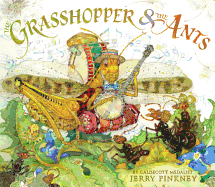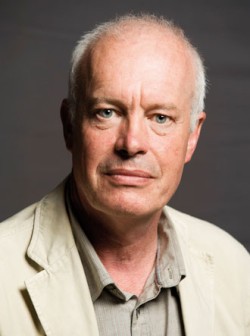 |
| photo: Julian Calder |
Robin Blake is the author of the Cragg and Fidelis series of historical mysteries, about the 18th-century coroner of Preston, Titus Cragg, and his friend Dr. Luke Fidelis. The latest, The Hidden Man, was just published by Minotaur in the U.S. and in the U.K. by Constable, under the title The Scrivener.
On your nightstand now:
The Death of Ivan Illych by Leo Tolstoy, in a new translation by Nicolas Pasternak Slater.
Favorite book when you were a child:
There were many favorites. Two that spring to mind are The Borrowers by Mary Norton and, a little later on, The Adventures of Sherlock Holmes by Arthur Conan Doyle. I vividly remember being captivated by the under-floor world of the inches-high Borrowers, and their clever adaptations of human stuff for their own uses. I found it heartbreaking that they were a practically extinct species. Of Holmes, my heart still beats a bit faster when I recall the line "The game's afoot!"
Your top five authors:
This is hard! For a top three, how about the infinitely clever James Joyce; George Orwell for his non-negotiable common sense; and Evelyn Waugh for being so seriously funny? Then William Makepeace Thackeray: I think Vanity Fair is one of the greatest novels in English. My favorite American writer might be Kurt Vonnegut. That's five. Tomorrow I might give an entirely different list, but I am pretty sure Joyce would be on it.
Book you've faked reading:
I don't do this. There are so many great books that it's impossible to read them all. So why pretend?
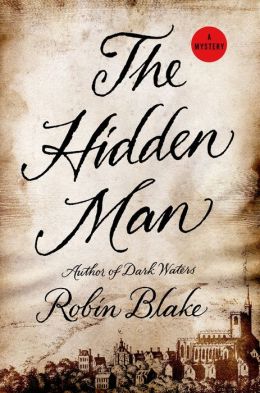 Book you're an evangelist for:
Book you're an evangelist for:
A Demon in My View by Ruth Rendell. A short and very creepy psychological gripper, which ought to be regarded as a classic.
Book you've bought for the cover:
Intimacy by Jean-Paul Sartre. I was about 14. The cover showed the back view of a nude girl in soft focus. I wasn't really ready for the stories however.
Book that changed your life:
A Portrait of the Artist as a Young Man by James Joyce. I've read many autobiographical novels but few as powerful as Joyce's account of growing up in late 19th-century Dublin. I don't know if the book actually changed me, but it did feel like that because I was 15 and, like every mid-teenager, going through all sorts of momentous changes in experience, belief and general outlook.
Favorite line from a book:
For obvious reasons, the best single lines are from poetry. You want something that says it all in a minimum of words. Quite hard to beat as a soft expression of a hard truth is Ernest Dowson's: "They are not long, the days of wine and roses."
W.B. Yeats's definition of sexual unhappiness strikes a bit harder: "It is terrible to desire and not possess, and terrible to possess and not desire."
Joyce's prayer in Finnegans Wake is a delightful twisting of words: "Loud, heap miseries upon us, yet entwine our arts with laughters low!"
Which character you most relate to:
When I was very young, that would be Beatrix Potter's Peter Rabbit, who makes foolish decisions and by a whisker's breadth escapes the consequences. Nowadays, I identify with Wilkie Collins's all too fallible narrator in The Moonstone, Gabriel Betteridge, who wonders "whether the gentlemen who make a business and a living out of writing books ever find their own selves getting in the way of their subjects, like me?"
Book you most want to read again for the first time:
When people tell me they haven't read a book that I admire, I say, "Lucky you!" I remember with special pleasure discovering certain novel sequences, in which characters meet and part and meet again in different circumstances over three, four, five or even 12 volumes. The Great Fortune is the first of Olivia Manning's Balkan trilogy, which continued in the equally brilliant Levant trilogy. I would love to be embarking on them for the first time.
What period is your favorite for historical fiction?
The trouble with novels set in the past is the remoter that past, the more the writer makes up, and the more anachronisms (things that wouldn't happen or words that wouldn't be used) creep in. For me, the Georgian period, which I write about, is special because the first novels about everyday life were written in that era. If you really know the novels and how novelists wrote at the time, you're less likely to go anachronistically astray. On the other hand you have to strike a balance in the use of period and modern English. In this sense, the most successful recent fiction set in the Georgian world may be the long series of fine novels by Patrick O'Brian, about the sailor Jack Aubrey and the surgeon/spy Stephen Maturin, written between 1969 and 1999.
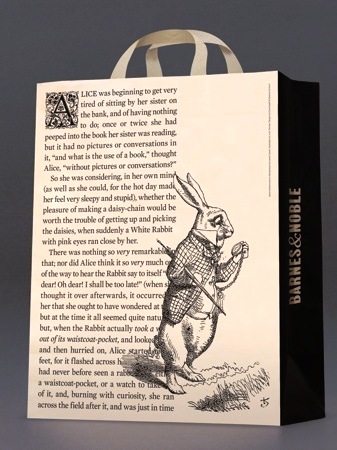 Barnes & Noble has redesigned its shopping bags to feature the text of the first pages of classic books such as Moby Dick, The Wizard of Oz, The Adventures of Huckleberry Finn and Alice in Wonderland, according to Ad Age's Creativity, which commented: "The designs are meant to promote Barnes & Noble as a physical destination that provides a tactile shopping experience--part of which is the act of leaving with a shopping bag."
Barnes & Noble has redesigned its shopping bags to feature the text of the first pages of classic books such as Moby Dick, The Wizard of Oz, The Adventures of Huckleberry Finn and Alice in Wonderland, according to Ad Age's Creativity, which commented: "The designs are meant to promote Barnes & Noble as a physical destination that provides a tactile shopping experience--part of which is the act of leaving with a shopping bag."








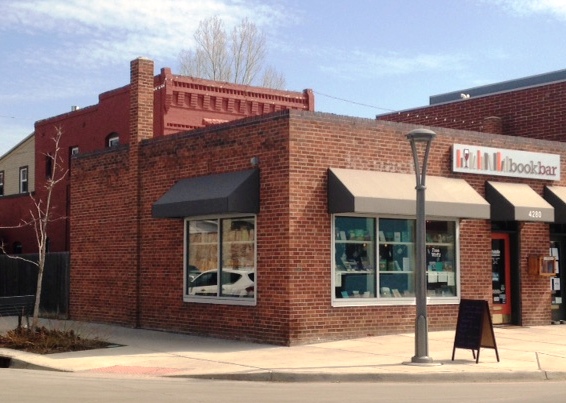 The expansion will bring the store's square footage up to approximately 2,250, and a good portion of the added retail space will go to expanding the store's small but thriving children's section. Currently, the store sells predominantly literary fiction, nonfiction and book club books and serves wine, coffee and a selection of finger foods.
The expansion will bring the store's square footage up to approximately 2,250, and a good portion of the added retail space will go to expanding the store's small but thriving children's section. Currently, the store sells predominantly literary fiction, nonfiction and book club books and serves wine, coffee and a selection of finger foods.
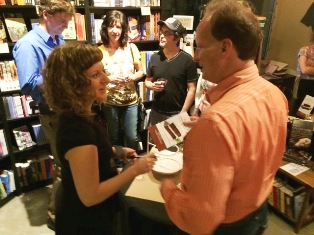
 Granada Books
Granada Books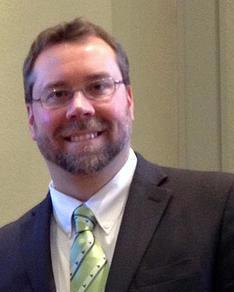
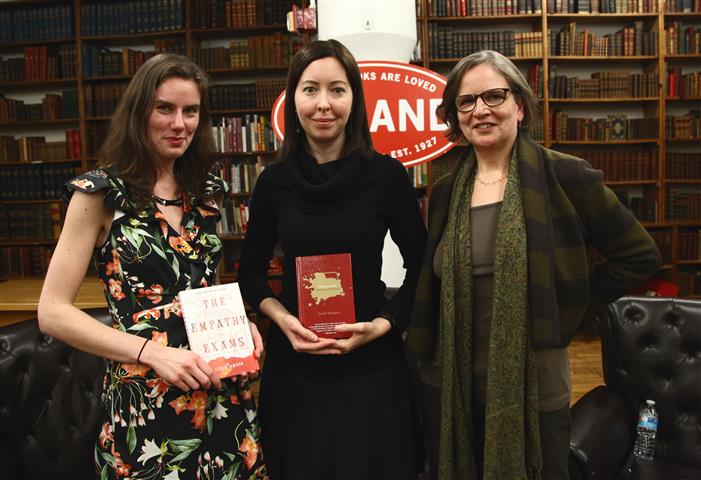
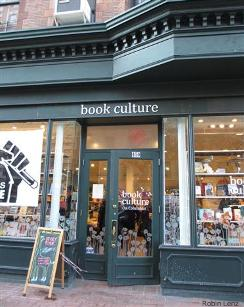 AMNewYork.com offers photos and brief profiles of
AMNewYork.com offers photos and brief profiles of 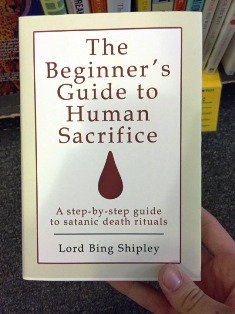 Uh oh. Someone with the handle
Uh oh. Someone with the handle 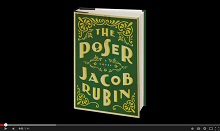 The Poser
The Poser
 Book you're an evangelist for:
Book you're an evangelist for: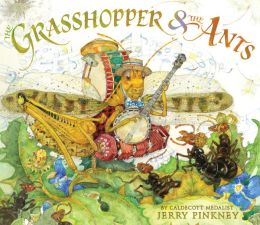 Caldecott Medalist Jerry Pinkney's (The Lion and the Mouse) translucent, sumptuous watercolors pay tribute to the seasons, from sunlight dancing on a pond in the spring to a barren winter landscape, in a retelling that extols the virtues of planning ahead as well as living in the moment.
Caldecott Medalist Jerry Pinkney's (The Lion and the Mouse) translucent, sumptuous watercolors pay tribute to the seasons, from sunlight dancing on a pond in the spring to a barren winter landscape, in a retelling that extols the virtues of planning ahead as well as living in the moment.